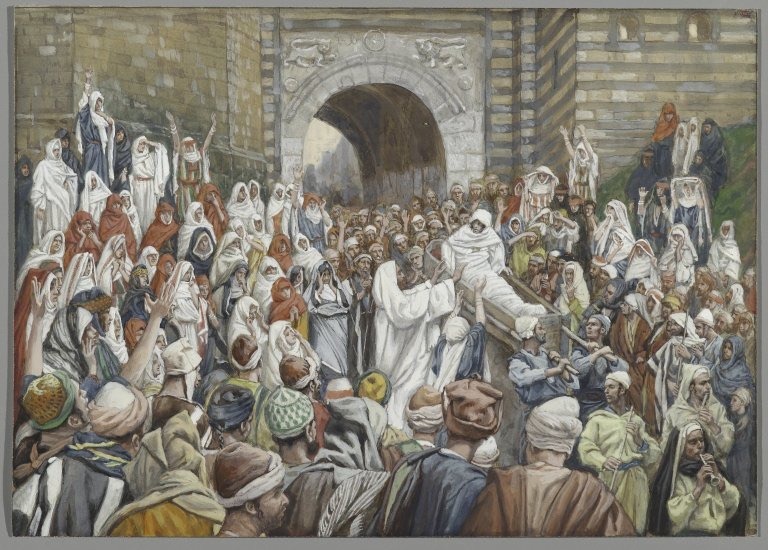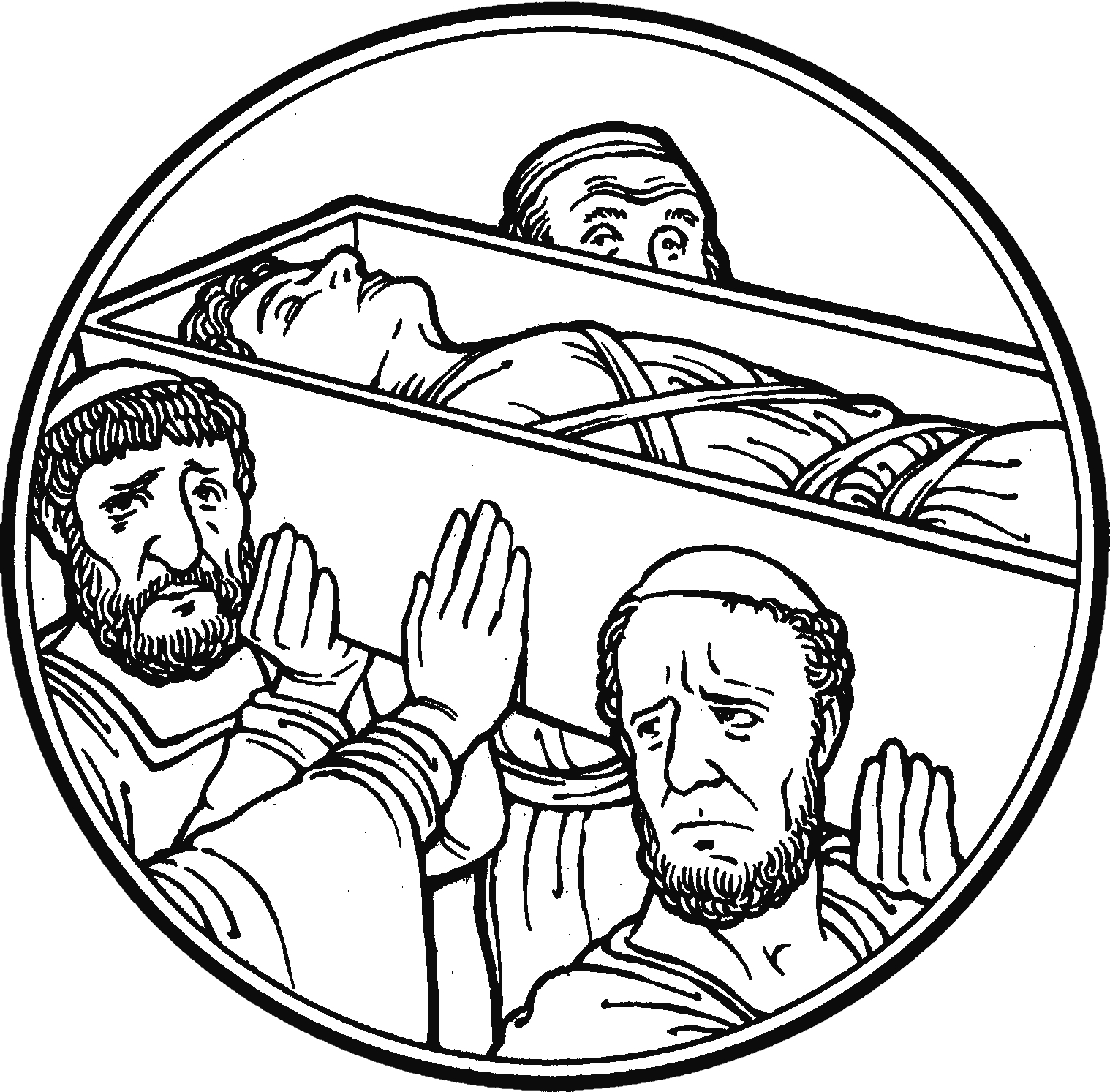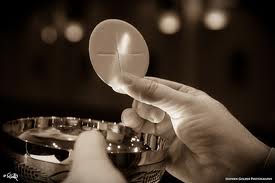
Click here for the bulletin with the readings for tonight’s service.
Alleluia! Christ is risen!
He is risen indeed! Alleluia!
In the name of Jesus. Amen.
Now and always, our God is the God of the living (Lk. 20:38).
From the very beginning of Scripture (Gen. 1:1-2:3), God creates and gives life to everything that and lives and breathes. God forms Adam from the dust of the ground with His own hand and breathes into his nostrils the breath of life (Gen. 2:7) because He is the God of the living.
In the time of the Flood (Gen. 7:1-5, 11-18; 8:6-18; 9:8-13) when every intention of the thoughts of mankind’s heart was choosing death, God brings destruction to those who rejected Him as the God of life. But He would not make a complete end. He instructed Noah to build an ark to save Noah, his family, and the animals. God did this to preserve the life He had created because He is the God of the living.
When God heard the groaning of His people who were slaves in Egypt, He remembered His covenant with them. God saw their affliction, and God knew (Ex. 2:23-25). God did all those signs and wonders to bring His people out of that land of slavery and death. He opened a way through the waters of the Red Sea so His people could escape Pharaoh’s deadly soldiers, pass through the watery tomb on dry ground, and arrive safely on the other shore (Ex. 14:10-15:1). He did this because He is the God of the living.
When they were scattered and exiled, God promised to bring His people to their own land. He promised to sprinkle clean water on them to wash them from all their uncleanness. He would remove the sinful, dead hearts of stone and give them living hearts of flesh (Ezk. 36:24-28) because He is the God of the living.
When His people were dried up bones (Ezk. 37:1-14), God gave His prophet Ezekiel a promise to proclaim: “I will open your graves and raise you from your graves. I will bring you into the land, and you shall know that I am the Lord. I will put My Spirit within you, and you shall live.” God made that promise because He is the God of the living.
When Job was suffering, he knew that his Redeemer lives (Job 19:20-27). And Job had no doubt that his Redeemer would stand victorious on the earth. Job rightly confessed even after his body died and his flesh was destroyed that his own eyes would see God because Job knew that God is the God of the living.
Faced with a blazing execution, Shadrach, Meshach, and Abednego refused to worship the pagan image that Nebuchadnezzar had set up (Dan. 3:1-30). They knew that God was able to deliver them from the burning fiery furnace and out of the king’s hand. But even if God didn’t deliver them they would not worship that dead, golden image. Even though they were bound and thrown into that inferno, they were not burned or singed because the God of the living walked with them both through and out of that fire.
The God of the living brings life to every corner of creation where we bring sin and, with our sin, death. The God of the living took on flesh and blood to take your place on Golgotha, the Place of the Skull (Mt. 27:33). Out of love for you who choose death, He willingly went to death to utterly defeat it. And when God dies, He doesn’t stay dead. He is the God of the living.
Jesus, your Savior, has and will come into your grave and bring you out. By His death, He has swallowed up death. “O death, where is your victory? O death, where is your sting?” Death’s only answer is, “I lost them. The God of the living has taken them away.”
Dear saints, because of the crucified, dead, buried, resurrected, ascended, and living Jesus, you now look for the resurrection of the dead and for the life of the world to come. Amen.
Alleluia! Christ is risen!
He is risen indeed! Alleluia!
The peace of God, which surpasses all understanding, will guard your hearts and minds in Christ Jesus. Amen.
 If Menards can have Christmas decorations out already and if the Hallmark Channel can do nonstop Christmas movies in July, then the Church can certainly have Easter in October. In fact, we have to celebrate Easter because this text screams Easter – loud and clear. But always before Easter, there is Good Friday. Before resurrection, there must be death. Good Friday sadness is a prerequisite to Easter joy. We have to see that first.
If Menards can have Christmas decorations out already and if the Hallmark Channel can do nonstop Christmas movies in July, then the Church can certainly have Easter in October. In fact, we have to celebrate Easter because this text screams Easter – loud and clear. But always before Easter, there is Good Friday. Before resurrection, there must be death. Good Friday sadness is a prerequisite to Easter joy. We have to see that first. Then, Jesus walks past the pallbearers, straight up to the bier, touches it, and says, “Young man, I say to you, arise,” as though He was waking up a sleepy teenager late on a Saturday morning. The boy gets up and begins to speak. I wonder what he said.
Then, Jesus walks past the pallbearers, straight up to the bier, touches it, and says, “Young man, I say to you, arise,” as though He was waking up a sleepy teenager late on a Saturday morning. The boy gets up and begins to speak. I wonder what he said. Jesus marches toward your funeral procession, and He does not stop or yield. Jesus does not give way or defer to death. Instead, Jesus defeats death with His death and resurrection, each and every time He meets it. Jesus meets you here today as you plod along in your personal funeral procession and gives you life. Jesus meets you at this altar to give you His living Body and His life-giving Blood.
Jesus marches toward your funeral procession, and He does not stop or yield. Jesus does not give way or defer to death. Instead, Jesus defeats death with His death and resurrection, each and every time He meets it. Jesus meets you here today as you plod along in your personal funeral procession and gives you life. Jesus meets you at this altar to give you His living Body and His life-giving Blood.
You must be logged in to post a comment.